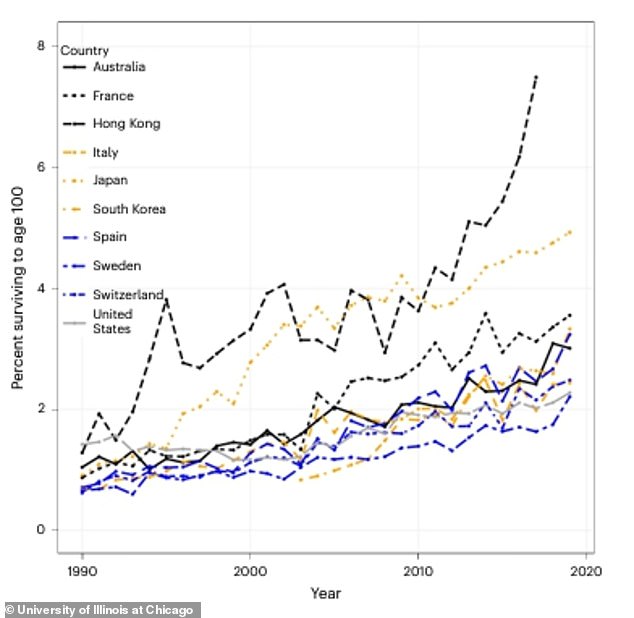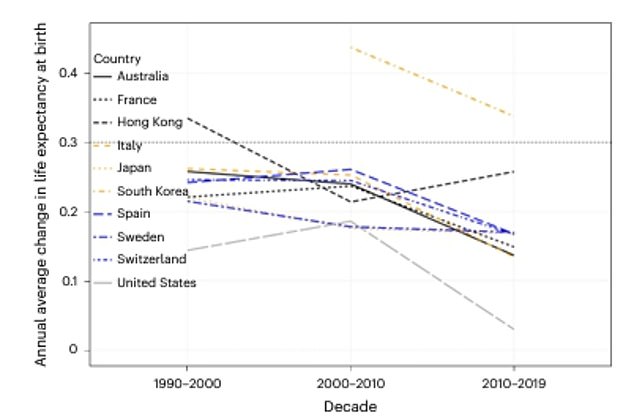We would probably all love to live to be 100 years old.
But the chances of achieving this remain very slim as the increase in life expectancy is slowing, experts say.
Researchers have found that we appear to be approaching the limits of human longevity, despite enormous jumps in life expectancy throughout the 19th century and the first half of the 20th thanks to advances in medicine.
Some forecasts from the 1990s even suggested that the majority of children born today would reach their centenary.
However, analysis has revealed that children born in recent years still have only a 5.3 percent chance of celebrating their centenary if they are women and an even lower chance of 1.8 percent if they are men.
We would probably all love to live to be 100, but the chances of achieving that remain very slim as the increase in life expectancy is slowing, experts say.

An analysis has revealed that children born in recent years still have only a 5.3 percent chance of celebrating their centenary if they are women and an even lower chance of 1.8 percent if they are men.
A team from the University of Illinois at Chicago examined mortality data from regions around the world, including Hong Kong, Australia, France and Spain.
They revealed that global average life expectancy increased from 48 years in 1900 to 67 years in 1950, and again to 76 years at the turn of the millennium.
However, in 2021 it had only increased to 77.
If “radical life extension” had continued, then this figure would be expected to be around 83 today, the team said.
Separate figures, provided by the Office for National Statistics, show that life expectancy has increased enormously in the UK since 1841, when the first figures are available.
At that time, a child born could only expect to live up to 40.2 years if it was a man and 42.3 years if it was a woman.

Global average life expectancy increased from 48 years in 1900 to 67 years in 1950, and again to 76 years at the turn of the millennium. However, by 2021 it had only increased to 77
This figure rose rapidly to 66.1 years for men and 70.6 years for women in 1950, and to 75.6 years for men and 80.4 years for women in 2000.
However, new figures show that a child born in 2022 can expect to live up to 78.9 years if male and 82.8 if female, representing a clear slowdown.

Analysis of the new data also revealed that those living in Hong Kong are more likely to celebrate their centenary (file image)
Analysis of the new data also revealed that those living in Hong Kong are more likely to celebrate their centenary: for children born in 2019, 12.8 percent of women and 4.4 percent of men will reach the birthday. milestone.
The team said there is no evidence to suggest that a “radical extension of life” has occurred or will occur in the 21st century, and they argue that the focus should now be on extending the number of years lived in good health.
Professor Stuart Olshansky, lead author of the study, said: “The majority of people living to older ages today live in a time manufactured by medicine.”
“But these medical band-aids are producing fewer years of life even though they occur at an accelerated rate, meaning that the period of rapid increases in life expectancy is now documented to be over.
‘We should now focus on efforts that slow aging and prolong health span.
“Health duration is a relatively new metric that measures the number of years a person is healthy, not just alive.”
In 1990, Professor Olshansky published a paper arguing that humans were approaching a lifespan ceiling of around 85 years, and that the most significant advances had already been made.
“Our result contradicts the conventional idea that the natural longevity endowment of our species is somewhere on the horizon, a life expectancy greater than what we have today,” he added.
The findings were published in the journal Nature Aging.


